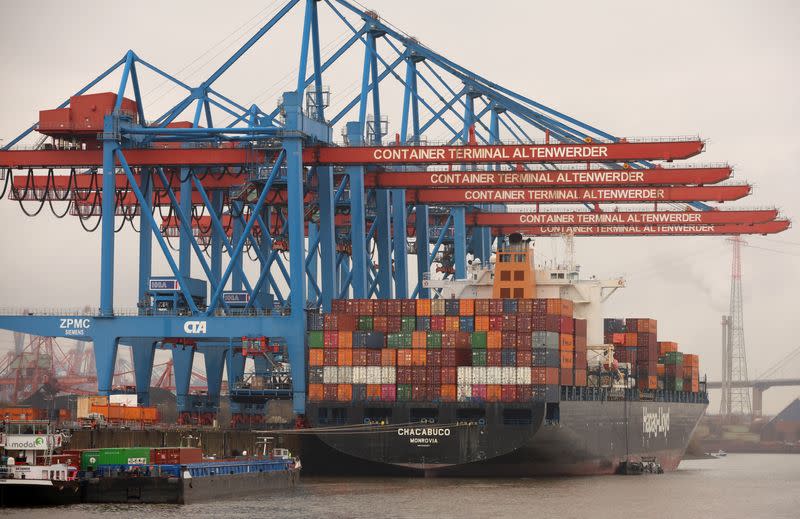Euro zone saw winter recession, more challenges ahead
By Philip Blenkinsop
BRUSSELS (Reuters) -The euro zone economy fell into a technical recession in the first three months of 2023, data from statistics agency Eurostat showed on Thursday as signs emerge that central bank rate hikes will crimp the region's future growth prospects.
Gross domestic product (GDP) for the 20-country euro zone fell by 0.1% in the first quarter compared with the final quarter of 2022, when GDP also slipped by 0.1%, revised from a previous reading of zero. Two successive quarters of contraction are commonly described as a technical recession.
"Domestic demand is not in a good place," Oxford Economics' analysts said in a note, adding first-quarter public spending saw the largest contraction on record except for during the first wave of coronavirus lockdowns in 2020.
"Going forward, growth will remain soft despite dropping wholesale energy prices, as monetary policy tightening dents investment and still-present inflationary pressures constrain consumption," they said.
Separately, economists polled by Reuters expect quarterly growth to rebound by an albeit modest 0.2% in each of the remaining three quarters of this year and tip the European Central Bank to hike by a further 25 basis points at both its June and July meetings in its effort to counter stubborn inflation.
That would take the ECB's deposit rate up to 3.75% in an unprecedented tightening of 425 basis points since the bank lifted rates out of negative territory last July.
Eurostat said euro zone GDP was 1.0% up in the first quarter from a year earlier, lower than a flash estimate of growth at 1.3% published on May 16. Economists polled by Reuters had forecast a 1.2% yearly expansion and zero growth on the quarter.
The revision was principally due to a second estimate from Germany's statistics office showing that the euro zone's largest economy was in recession in early 2023.
The contraction in Ireland's economy widened to 4.6% from a preliminary estimate of 2.7%, although this negative was due to the impact of large multinationals on growth there.
A recession had been expected towards the end of last year as the euro zone wrestled with high energy and food prices and as a post-pandemic spending boom faded. Initial estimates had suggested the region had avoided this.
Along with Germany and Ireland, GDP also declined quarter-on-quarter in Greece, Lithuania, Malta and the Netherlands.
Eurostat said that household spending stripped 0.1 percentage point, public expenditure 0.3 points and inventory changes 0.4 points from quarterly GDP. Gross fixed capital formation added 0.1 point and net trade a further 0.7 points as imports declined.
Conversely, employment growth accelerated at the start of 2023, rising to 0.6% in the first quarter from 0.3% in the fourth quarter of 2022, in line with earlier estimates. That was 1.6% up year-on-year.
On a quarterly basis, employment grew in every country except Greece, Lithuania and Slovakia.
For further details of Eurostat data click on:
http://ec.europa.eu/eurostat/news/news-releases
(Reporting by Philip Blenkinsop; Editing by Mark John, Sharon Singleton and Susan Fenton)



